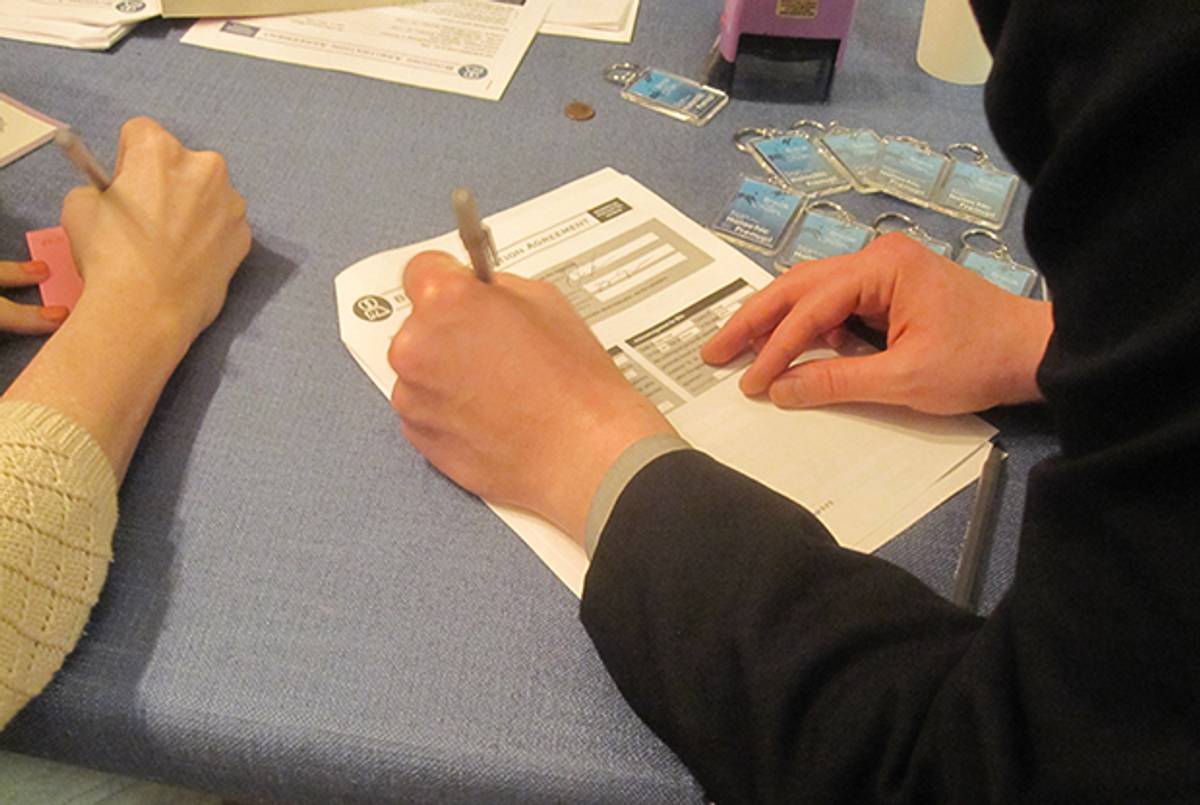
Last night, about two dozen people took a break from cleaning out their cupboards of the tiniest breadcrumbs before Passover to attend a “Halachic Pre-nup/Post-nup Party” at Chevra Ahavas Yisroel, a Lubavitch synagogue in Crown Heights known for its “strict policy of no policy,” as its spiritual leader Rabbi Chezzie Denebeim puts it. Over wine and cheese, attendees discussed the topic that has recently become a cause célèbre amongst liberal Lubavitchers: the dilemma of the agunah, or “chained woman.” In Orthodox Judaism, a man must grant a divorce document, known as a “get,” to his wife; without such a document, the woman cannot remarry, and any children she has outside the marriage—with, say, another partner of her own choosing—are labeled illegitimate, which carries significant stigma within the frum world. The event focused on a solution to the issue: halakhic pre- and post-nuptial agreements.
The agunah crisis has previously gotten attention within the Modern Orthodox world, but the focus on the issue is relatively new in the Haredi sphere. Many cite the death of Chani Kuperman, nee Wilenkin, on Purim of this year, as the reason. Kuperman, a mother of six and a teacher at Bais Rivkah in Crown Heights, had been waiting for a year for a get from her husband Shmuel Kuperman, a prominent local rabbi, when she died of cancer. Her family alleges Kuperman abused his wife, and her last wish was to die a free woman; instead, he abused her further by forcing her to die with his name. Others in the community say that the story is a ploy on the part of the Wilenkin family to gain custody of the couple’s children.
On March 22, protestors led by activist Itta Werdiger Roth marched through the heart of Chabad Crown Heights chanting slogans like, “Only change will unchain!” Several people who attended the protest also attended last night’s event at Ahavas Yisroel, which, while dubbed a “party,” was more of an information session on pre-nuptial or post-nuptial agreements written specifically to avoid such situations—agreements some hope will become compulsory some day soon.
“Thousands of couples have signed halakhic prenups”—binding agreements that a couple will appear in religious court or pay continual fines—“in the past 20 years,” explained Allison Josephs, who runs the blog Jew in the City and who attended last night’s event. “In 100 percent of the disputes where a pre-nup was signed, a woman has gotten her get in six months or less,” she said, citing a statistic given by the Organization for Resolution for Agunot. “When I heard that, I thought, ‘This is a no-brainer.’”
But despite its apparent efficacy, many still worry that there isn’t sufficient rabbinical support, or that the Beit Din of America’s pre-nuptial agreement, endorsed by Rabbi Zalman Nechemia Goldberg, amounts to a get me’useh, or forced divorce, which is invalid in Jewish law. Even at Chevra Ahavas Yisroel, there is chatter about whether or not a pre-nup will allow couples to abandon marriages that could be saved, or force husbands to agree to divorces without suitable reason. There are also worries that the discussion of divorce will detract from the romance that should characterize the blissful days before marriage.
Advocates of the measure pointed out the flawed logic of the final point. “The ketubah talks about the dissolution of a marriage, and we have no problem signing that,” said Mindy Fersel, ORA’s assistant director of advocacy and legal strategy. “I would say it’s very romantic, because you’re saying to your spouse or your fiancé, ‘No matter what, I will never hurt you.’” Get refusal for any reason, she added, is a form of domestic abuse, and the women who come to ORA for help often say they feel “enslaved,” a particularly timely metaphor considering that Passover begins on Friday. “We need to put an end to that suffering,” Fersel said.
The speeches over, couples gathered around a table at the back of the synagogue to sign the post-nuptial agreements and have them notarized. A young blond woman grinned as she suggested her husband ceremonially put her ring back on her finger. “We’re going to really be a voice for this,” she said.
Josephs and her husband of a decade stood nearby, waiting to sign theirs. Behind them was a couple from Borough Park, a neighborhood where there is arguably even more resistance to the idea of a pre-nuptial agreement than there is in Crown Heights. Chani, 31, is optimistic that it will catch on. “There are a lot of weddings in Borough Park,” she said. “Hopefully this will become required before you get married.”
Kelsey Osgood has contributed to The New Yorker, Time, and Salon, and is the author of the book How to Disappear Completely: On Modern Anorexia.